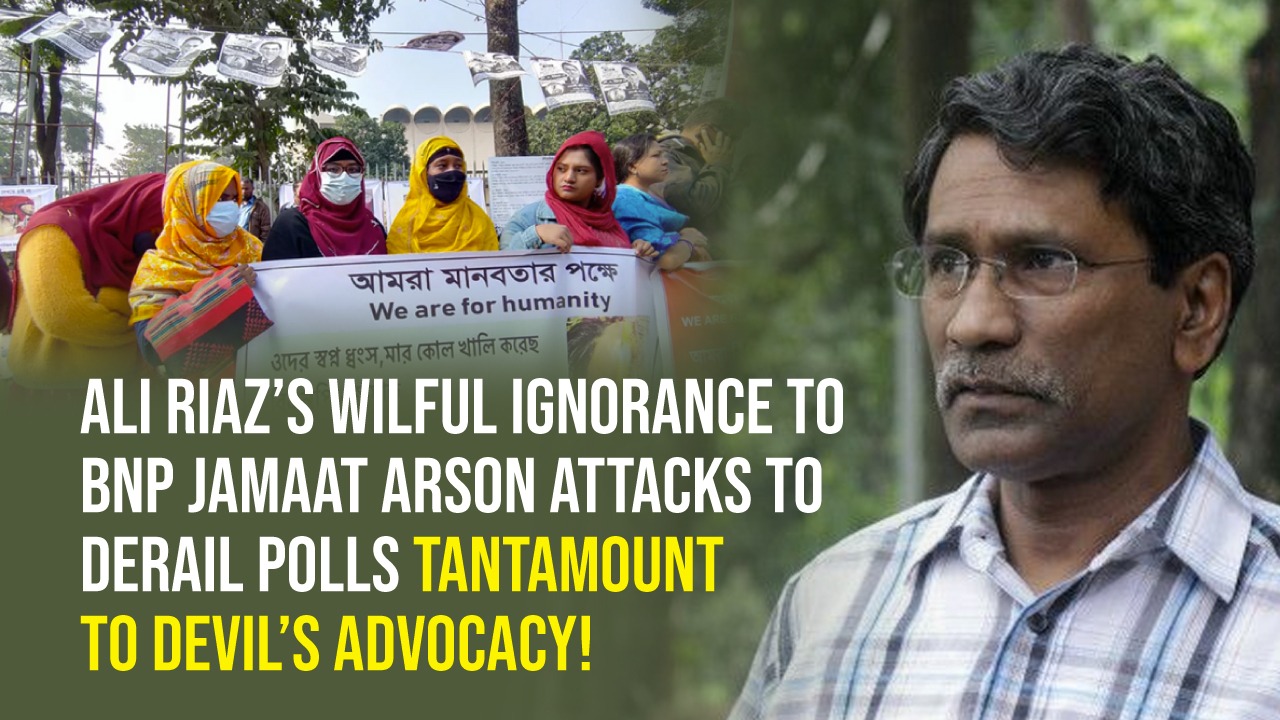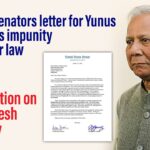“If they believe in democracy, how can they speak on behalf of the killers (BNP Jamaat) who count on burning people alive to grab power? Their (a section of rights bodies with partisan views like BNP Jamaat movement is not violent) statements do not match the cover neutrality. How can one advocate for the rights of those who burn people alive?” a plea reportedly echoed by hundreds of voters who fell to arson attacks and their families in the weeks leading up to polls.
Weeks back these victims took to the streets to express their resentment against a series of narratives peddled by some so-called foreign rights bodies and foreign governments. According to them, any narrative that seeks to project BNP Jamaat as a non-violent party and downplays the violence only stonewalls efforts to bring the arson attackers to justice.
Yet in a direct assault on the pleas of these victims, one Ali Riaz, who takes the identity as a distinguished academic in the US, has made another desperate and glaring advocacy for BNP Jamaat.
In addition to wilful ignorance of a series of visuals that show BNP leaders setting fire to buses, Riaz went a step further and churned out a new defence line for BNP’s fugitive acting chief already earned notoriety as a symbol of violent politics.
“The BNP also showed that it can remain nonviolent despite provocations” what Ali Riaz exactly wrote in his piece published in the Atlantic, where the anti-democratic boycott campaign was projected as “Democratic”.
The very claim that BNP exhibited non-violence is a testament to his ardent drive to immune BNP arsonists from deadly spells of violence, a marker belies his vaunted cover of objectivity and neutrality.
Rather brazen advocacy for arsonists is akin to undermining the verdict delivered by 50 million people for Awami League, a marker of the country’s democratic process.
Set aside Riaz’s deaf ear to the heart-wrenching cries of hundreds of survivors and families, the assertion of “provocation” is a new conundrum that adds a fresh impetus to BNP Jamaat spin doctors also to cover up their arson attacks.
Observers say Riaz tried to boost up the sullied image of the BNP as activists were caught red-handed with petrol bombs while some leaders were caught on camera setting buses on fire.
Complete reluctance on the part of Riaz to mention that a similar spell of arson orchestrated by BNP Jamaat back in 2013, 2014 and 2025 on voters in run down to the tenth parliamentary polls is another marker that Riaz cares little about neutrality but is guided more by his political alignment.
Moreover, he cited an offshore portal run by the son-in-law of opposition leader Dr Kamal and another self-exiled activist Tasneem Khalil to raise questions about voter turnout.
Khalil already drew rebukes for undermining atrocities inflicted by radicals backed directly by Tarique then the heir apparent when her mother ruled the country between 2001 and 2006.
The reality is EC officials offered several updates on voter turnout in different phases till the counting ended on election day but Riaz only resorted to the first update and claimed the other updates couldn’t be taken into account, just like the echo chamber of BNP Jamaat.
Riaz’s reliance on such an offshore portal’s refusal to accept EC’s challenge to offer proof of irregularities and refusal to get to terms with the reality that only the last update on turnout offers the entire vote is another potent that diminishes his credibility further.
In his bid to project BNP’s boycott strategy supported by the majority, Riaz kept mum over how earlier rallies by BNP failed to attract support, in contrast to the huge turnout in Awami League rallies.
Even in 2013 when the combine employed a similar boycott, their advocates claimed people would back BNP but over the years the people stood by Awami league with the popularity of the party president scaled to new heights, a reality Riaz would never want the world to know.
The debilitating leadership crisis that engulfed BNP since the elevation of Tarique Rahman as the acting chief who had been described as a dummy chief for his way of operating the party from London.
Even before the polls, a large number of BNP leaders abandoned Tarique and blamed his pursuit for a violent path— directives to leaders and activists for arson attacks—. These leaders later took part in elections also and publicly revealed that Tarique and his handpicked leadership were the biggest burden for the party.
His decades of stay in London made him aloof from the on-ground reality that without resorting to democratic activities no party can survive, they added.
During her mother’s rule, Tarique built up an empire with his hand-picked ministers and cronies including militants. Flagrant corruption and propping up radicals and militants were what defined Tarique back then.
Tarique has been living in London for decades since he left Bangladesh given that he would stay out of politics after his world of crimes got exposed and he was brought to justice. But her mother Khaleda made his release and exit a bargaining chip for her party to participate in polls in 2008, getting a concession from the respective government back then.
But Ali Riaz failed to mention such a grappling crisis that led to the debacle of BNP a crisis deemed as the outfit’s own making.





